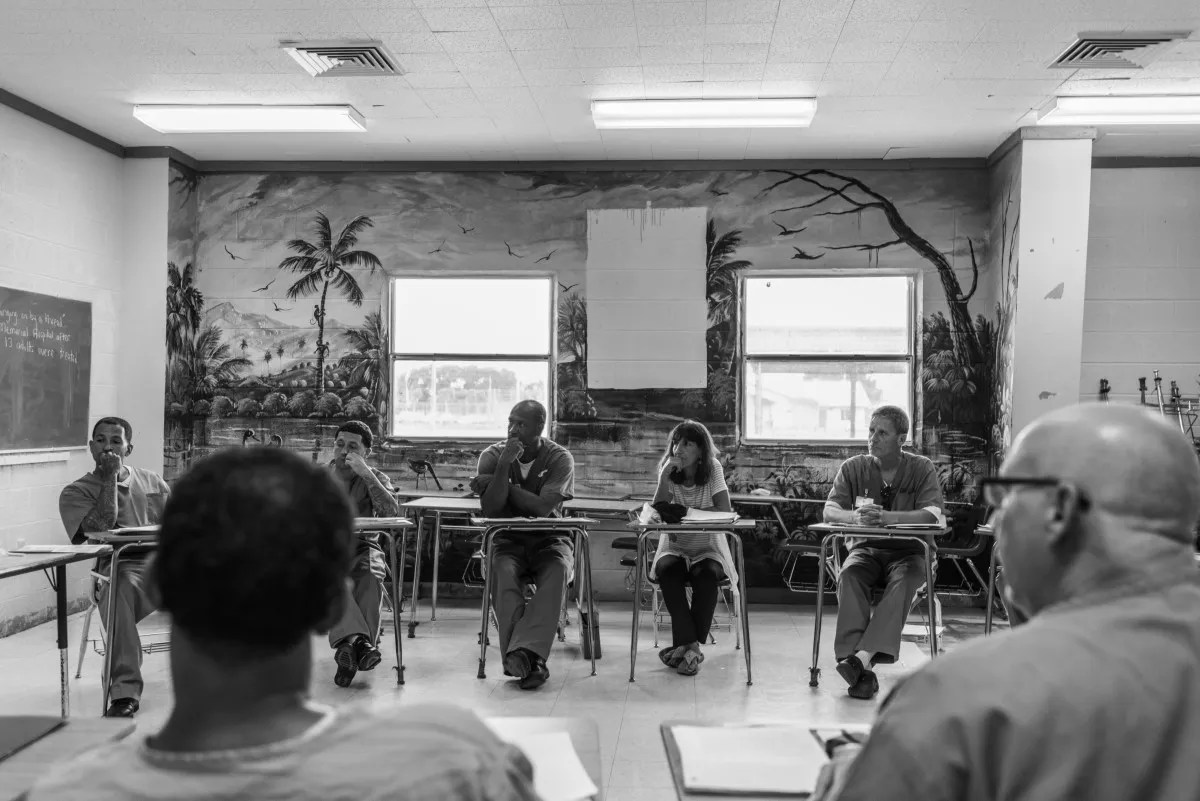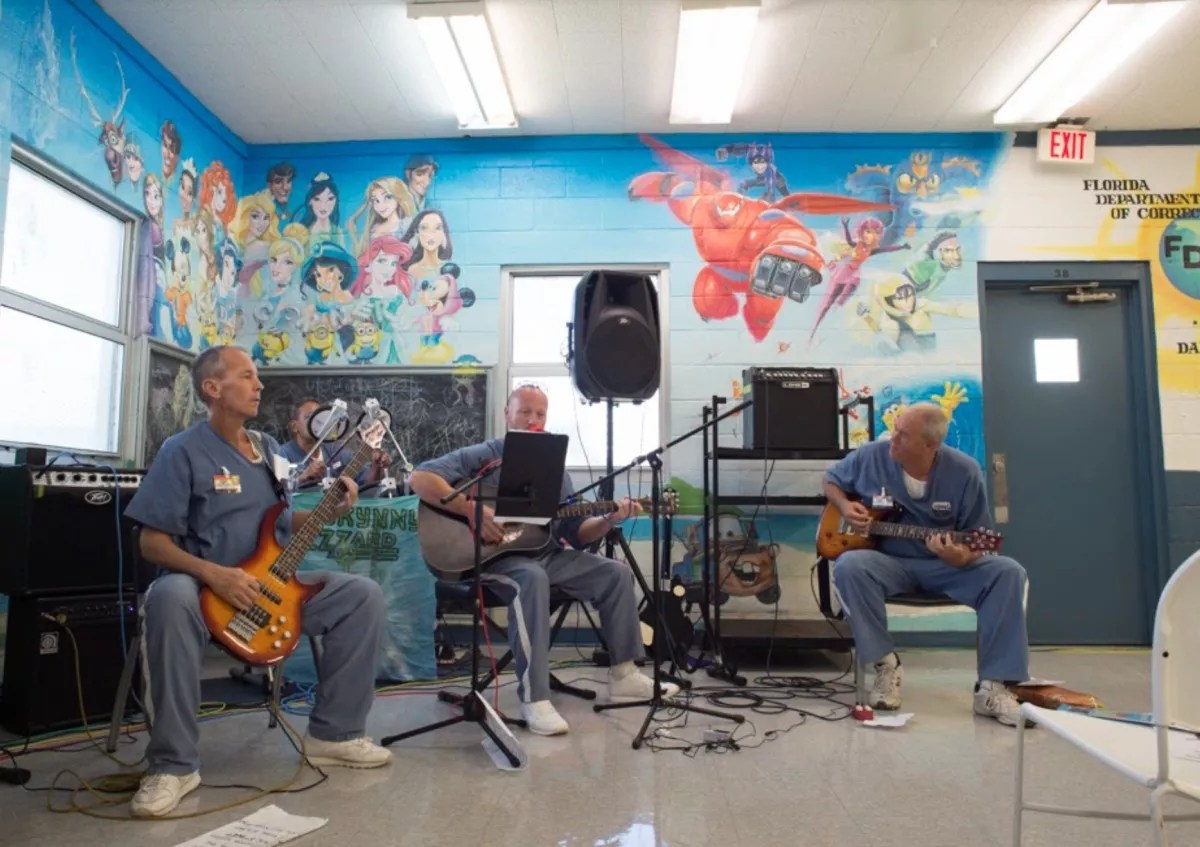
Photo courtesy of Exchange for Change

Audio By Carbonatix
Over the years, author Kathie Klarreich has witnessed rival gang members come together to discuss the work of Shakespeare, Zora Neale Hurston, and Edwidge Danticat. Since 2014, Klarreich’s nonprofit, Exchange for Change (E4C), has taught about these literary greats and others through semester-long writing courses in Florida’s prisons.
The writing classes have been a lifeline for inmates to make contact with the outside world and tell others their stories. One of the E4C’s chief aims is to effect social change by promoting the words of South Florida’s incarcerated communities, which it did without skipping a beat until COVID-19 came on the scene in the spring. As cities across the state went into lockdown, so did prisons, making it difficult for the teachers to correspond with their students.
Before the virus hit South Florida, Klarreich was in the classroom at least three days a week teaching incarcerated students. Since internet access was, at the time, as “invisible as COVID-19” in Florida’s prisons, she was unable to immediately adapt her courses to Zoom or video chat sessions.
And Klarreich realized her students had more serious concerns than missing their writing classes. Among the incarcerated students the program has reached – more than 1,500 to date – were John Barrett and Joseph Calandra, each of whom died in recent months from COVID-related complications. Both had been serving life sentences for murder since the early ’90s.
“We were extremely saddened to learn of the passing of Mr. Barrett and Mr. Calandra,” Klarreich tells New Times. “If it’s hard for the E4C staff to reconcile their deaths, it’s got to be exponentially more difficult for their families.”

John Barrett (left) performing with other musicians in a Florida prison.
Photo courtesy of Exchange for Change
Barrett’s sister, Tina, believes her brother did not receive quality care when he was sick with the coronavirus in Florida’s prison system.
“His last days were evidently miserable. He was moved from place to place,” she says. “If they had called me and said they didn’t know what to do with him and they needed to get rid of him, I’d have gladly come to get him.”
Some consolation – and still, further grief – has come in reading what she has of her brother’s poignant writings through Exchange for Change’s program.
In an untitled poem Barrett wrote in 2018, he pondered the meaning of freedom. It starts:
Freedom, what is it? Who is it for?
I used to think it was me but I don’t anymore
I thought Americans were free
But I found out that they’re not
If freedom were free I’d have some
“I grieved for my brother years ago because I thought his life was taken from him,” says Tina Barrett. “I’ve learned that he had a life to live and he was living it to the fullest extent possible…. [He] helped others come to grips with their own limitations and abilities.”
Though technological resources were initially inadequate for Exchange for Change to carry out virtual learning, circumstances changed over the summer. Klarreich was able to run one course online for incarcerated students across the state, which has opened the doors for this fall’s fleet of 16 virtual courses, which are being taught across five Florida prisons.
Though E4C’s course offerings have decreased – this past spring, it offered 33 classes – the nonprofit’s courses this fall will help inmates write about how the pandemic has affected them, given their physical and systemic constraints.
As New Times has reported, physical distancing in Florida’s correctional facilities is practically futile, and the facilities have become Petri dishes for the deadly respiratory disease. In federal prisons, 70 percent of tested inmates have been positive for COVID-19. In Florida, which has the nation’s third-largest prison system, 131 state inmates have died from COVID-19 or related complications.
During the health crisis, E4C’s students have been documenting their harrowing experiences surviving COVID while behind bars – and the struggles of quarantine and further isolation. Their work will culminate in an anthology that currently has the working title “Covid Collection.” It is slated for release early next year.
Studies indicate that inmates who enroll in educational programs are nearly 50 percent more likely to stay out of prison when they are released. Every dollar invested in prison education has been found to save, on average, $4 or $5 on reincarceration.
“They are more successful, they have better chances of gaining employment and staying out,” Klarreich says. “So it’s not an emotional response – it’s actually proven that these kinds of programs help people thrive inside.”
Still, before their lives on the outside can begin, E4C’s students first have to survive this nightmarish moment. By documenting how officials respond to the health crisis, supporters of the nonprofit hope those in power will be held accountable for how they treat the sick and exasperated.
Three writing clips from Exchange for Change students are embedded below: